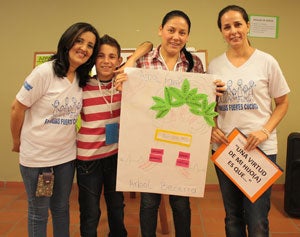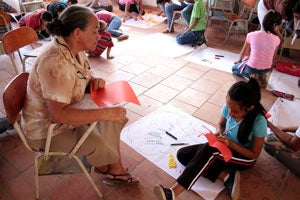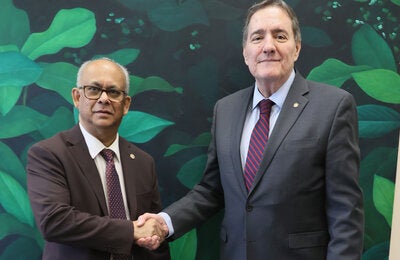

The "Strengthening Families" program promotes family environments that protect 10—14-year-old children in order to prevent substance abuse and other risky behaviors. Since 2012, it has benefited 450 families in the Andean Community.
The "Strengthening Families" program promotes family environments that protect 10—14-year-old children in order to prevent substance abuse and other risky behaviors. Since 2012, it has benefited 450 families in the Andean Community.
Washington DC, 15 May 2013 (PAHO/WHO).- "We were very distant; we never spoke about things like sexuality or drug addiction. We only talked about homework or chores, but there was not much closeness," reports the head of household of the Gómez Becerra family in Cúcuta, Colombia, on the relationship she had with her son before participating in the program Strengthening Families: Love and Limits, promoted by Pradican, a program against illegal drugs in the Andean Community.

The initiative, with support from the European Union and the Pan American Health Organization/World Health Organization (PAHO/WHO) since 2012, aims at promoting a family environment to protect against substance abuse and other risky behaviors that can endanger the health of 10—14-year-old adolescents.
Almost 230 million people worldwide used illegal drugs at least once in 2010, according to the World Drug Report 2012 of the United Nations Office on Drug and Crime (UNODC). In the Andean Community, 10% of the 100 million inhabitants are between 10 and 14 years old and providing activities for this age group is key to preventing the onset of drug abuse.

The Gómez Becerra family is one of the 45 families in Cúcuta (located on the border with Venezuela) and the 450 families in Bolivia, Colombia, Ecuador, and Peru that have benefited from the Strengthening Families program. Indira Villa, program coordinator in that Colombian municipality, reported that in seven participatory sessions, parents and children participated in skits and role playing, among other activities, to address subjects such as love and limits, household rules, goals and dreams, appropriate behavior, stress, peer pressure, and risky behaviors.
During the workshops, parents learned effective disciplinary techniques and gained skills in connecting emotionally with their children, getting closer to them with more confidence and empathy. "It used to be taboo for us to mention drugs or sex, but now we have learned that it helps to discuss these subjects and that it is our responsibility as parents to better inform our daughter," affirmed the head of household of the Uribe Camacho family.
The adolescents were also strengthened by the experience. According to the coordinator, their communication with their parents improved as well as their ability to make healthy decisions and avoid risky behaviors. They also developed effective skills for coping with stress and peer pressure and had a greater understanding of the value of respecting rules and the efforts their parents make in raising them.

"I liked it because I learned about sexuality at an early age, sexual transmission, and how to avoid drug and alcohol abuse," said one of the program's youngest participants.
In addition to Cúcuta, the program was applied in the Colombian cities of Palmira, Manizales, and Barranquilla; in Quito, Ecuador; and in Bolivia in the district of Pampahasi. In Peru, it started in 2005 and is now offered in more than 20 regions of the country.
Strengthening Families is an adaptation of the Iowa Strengthening Families Program (ISFP), adapted by PAHO/WHO and its authors to the social and cultural reality of the Americas. It has been scientifically shown to be effective in delaying the onset of the use of tobacco, alcohol, and other substances; decreasing the level of aggression; and increasing resistance to peer pressure. It has also been effective in increasing parents' child-raising skills, as well as skills in setting limits, showing affection and support for their children.
International Day of Families has been observed every May 15th since 1994. The date was proclaimed in 1993 by the United Nations General Assembly to emphasize the importance of the family in the international community.
Links



